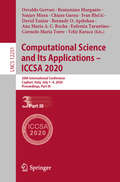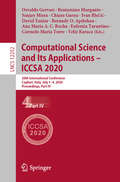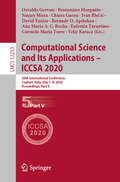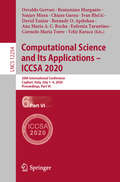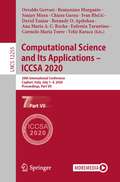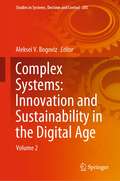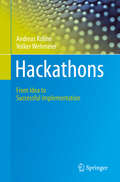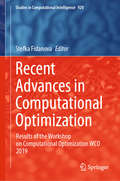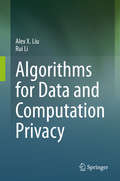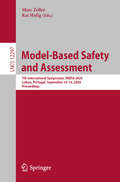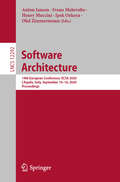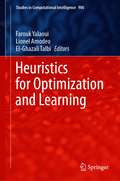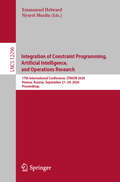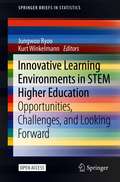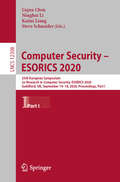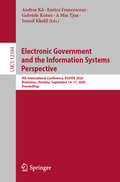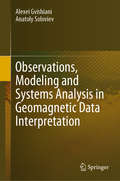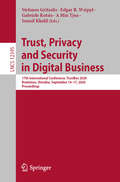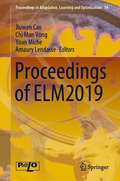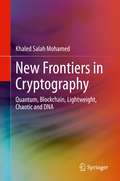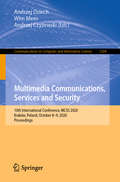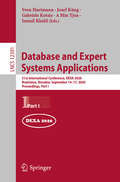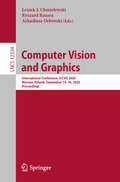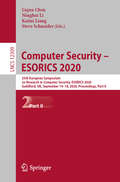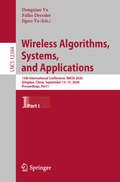- Table View
- List View
Computational Science and Its Applications – ICCSA 2020: 20th International Conference, Cagliari, Italy, July 1–4, 2020, Proceedings, Part III (Lecture Notes in Computer Science #12251)
by Osvaldo Gervasi Beniamino Murgante Sanjay Misra Chiara Garau Ivan Blečić David Taniar Bernady O. Apduhan Ana Maria A. C. Rocha Eufemia Tarantino Carmelo Maria Torre Yeliz KaracaThe seven volumes LNCS 12249-12255 constitute the refereed proceedings of the 20th International Conference on Computational Science and Its Applications, ICCSA 2020, held in Cagliari, Italy, in July 2020. Due to COVID-19 pandemic the conference was organized in an online event.Computational Science is the main pillar of most of the present research, industrial and commercial applications, and plays a unique role in exploiting ICT innovative technologies.The 466 full papers and 32 short papers presented were carefully reviewed and selected from 1450 submissions. Apart from the general track, ICCSA 2020 also include 52 workshops, in various areas of computational sciences, ranging from computational science technologies, to specific areas of computational sciences, such as software engineering, security, machine learning and artificial intelligence, blockchain technologies, and of applications in many fields.
Computational Science and Its Applications – ICCSA 2020: 20th International Conference, Cagliari, Italy, July 1–4, 2020, Proceedings, Part IV (Lecture Notes in Computer Science #12252)
by Osvaldo Gervasi Beniamino Murgante Sanjay Misra Chiara Garau Ivan Blečić David Taniar Bernady O. Apduhan Ana Maria A. C. Rocha Eufemia Tarantino Carmelo Maria Torre Yeliz KaracaThe seven volumes LNCS 12249-12255 constitute the refereed proceedings of the 20th International Conference on Computational Science and Its Applications, ICCSA 2020, held in Cagliari, Italy, in July 2020. Due to COVID-19 pandemic the conference was organized in an online event.Computational Science is the main pillar of most of the present research, industrial and commercial applications, and plays a unique role in exploiting ICT innovative technologies.The 466 full papers and 32 short papers presented were carefully reviewed and selected from 1450 submissions. Apart from the general track, ICCSA 2020 also include 52 workshops, in various areas of computational sciences, ranging from computational science technologies, to specific areas of computational sciences, such as software engineering, security, machine learning and artificial intelligence, blockchain technologies, and of applications in many fields.
Computational Science and Its Applications – ICCSA 2020: 20th International Conference, Cagliari, Italy, July 1–4, 2020, Proceedings, Part V (Lecture Notes in Computer Science #12253)
by Osvaldo Gervasi Beniamino Murgante Sanjay Misra Ana Maria A. C. Rocha David Taniar Bernady O. Apduhan Eufemia Tarantino Chiara Garau Ivan Blečić Carmelo Maria Torre Yeliz KaracaThe seven volumes LNCS 12249-12255 constitute the refereed proceedings of the 20th International Conference on Computational Science and Its Applications, ICCSA 2020, held in Cagliari, Italy, in July 2020. Due to COVID-19 pandemic the conference was organized in an online event.Computational Science is the main pillar of most of the present research, industrial and commercial applications, and plays a unique role in exploiting ICT innovative technologies.The 466 full papers and 32 short papers presented were carefully reviewed and selected from 1450 submissions. Apart from the general track, ICCSA 2020 also include 52 workshops, in various areas of computational sciences, ranging from computational science technologies, to specific areas of computational sciences, such as software engineering, security, machine learning and artificial intelligence, blockchain technologies, and of applications in many fields.
Computational Science and Its Applications – ICCSA 2020: 20th International Conference, Cagliari, Italy, July 1–4, 2020, Proceedings, Part VI (Lecture Notes in Computer Science #12254)
by Osvaldo Gervasi Beniamino Murgante Sanjay Misra Chiara Garau Ivan Blečić David Taniar Bernady O. Apduhan Ana Maria A. C. Rocha Eufemia Tarantino Carmelo Maria Torre Yeliz KaracaThe seven volumes LNCS 12249-12255 constitute the refereed proceedings of the 20th International Conference on Computational Science and Its Applications, ICCSA 2020, held in Cagliari, Italy, in July 2020. Due to COVID-19 pandemic the conference was organized in an online event.Computational Science is the main pillar of most of the present research, industrial and commercial applications, and plays a unique role in exploiting ICT innovative technologies.The 466 full papers and 32 short papers presented were carefully reviewed and selected from 1450 submissions. Apart from the general track, ICCSA 2020 also include 52 workshops, in various areas of computational sciences, ranging from computational science technologies, to specific areas of computational sciences, such as software engineering, security, machine learning and artificial intelligence, blockchain technologies, and of applications in many fields.
Computational Science and Its Applications – ICCSA 2020: 20th International Conference, Cagliari, Italy, July 1–4, 2020, Proceedings, Part VII (Lecture Notes in Computer Science #12255)
by Osvaldo Gervasi Beniamino Murgante Sanjay Misra Ana Maria A. C. Rocha David Taniar Bernady O. Apduhan Eufemia Tarantino Chiara Garau Ivan Blečić Carmelo Maria Torre Yeliz KaracaThe seven volumes LNCS 12249-12255 constitute the refereed proceedings of the 20th International Conference on Computational Science and Its Applications, ICCSA 2020, held in Cagliari, Italy, in July 2020. Due to COVID-19 pandemic the conference was organized in an online event.Computational Science is the main pillar of most of the present research, industrial and commercial applications, and plays a unique role in exploiting ICT innovative technologies.The 466 full papers and 32 short papers presented were carefully reviewed and selected from 1450 submissions. Apart from the general track, ICCSA 2020 also include 52 workshops, in various areas of computational sciences, ranging from computational science technologies, to specific areas of computational sciences, such as software engineering, security, machine learning and artificial intelligence, blockchain technologies, and of applications in many fields.
Complex Systems: Volume 2 (Studies in Systems, Decision and Control #283)
by Aleksei V. BogovizThis book provides a coherent framework for understanding the essence of complex systems and the nature of digital transformations, analyzes challenges of and patterns in innovative development, and shares a wealth of insights and best practices, resulting in the most extensive coverage of the topic available.In particular, the book’s cutting-edge contributions, prepared by scientists, engineers, and field experts,focus on the design, implementation, and evaluation of practical interventions that promote the innovative and sustainable development of complex systems. In addition to sharing a rich collection of cases from around the world, they provide a broad interdisciplinary analysis of collaboration mechanisms, theories and approaches to support and accelerate the development of complex systems.
Hackathons: From Idea to Successful Implementation
by Andreas Kohne Volker WehmeierThis book provides a detailed and comprehensive overview of all phases of a hackathon and thus helps to reduce complexity, to use opportunities, to avert pitfalls and to avoid problems. In addition, it also explains from a participant’s perspective how to succeed in a hackathon. Lastly, the book is rounded off by extensive checklists, which support you in your own hackathons. The book is structured as follows: At first the basics and the history of hackathons are described in chapter 1. Afterwards the three phases of a hackathon are described in detail. This is started in chapter 2 with the description of the individual measures which are to be accomplished before the actual event. Here not only technical or organizational aspects are described, but also the important legal aspects are discussed. Subsequently, it is shown what is necessary to carry out a hackathon successfully. For this purpose the actual execution with all its steps is described in chapter 3. Next, chapter 4 looks at the follow-ups, which are often neglected or even completely forgotten. Chapter 5 describes from a participant’s point of view the reasons for participating in a hackathon and which aspects guarantee a successful participation. In the following chapter 6 the criticism of the format of the hackathons and their execution is also examined in detail. Eventually, the most important points are summarized in chapter 7, before chapter 8 gives a view into the future of hackathons. Subsequently chapter 9 collects statements and opinions of representatives from industry, science and administration on the topic of hackathons. The book is rounded off in chapter 10 with detailed checklists, which can be directly used for the successful planning, operation and follow-up of hackathons. The book is written for everyone with an interest in how hackathons work, how to create them, and how to successfully participate. It especially targets people in industry or young students who want to run or participate in a hackathon.
Recent Advances in Computational Optimization: Results of the Workshop on Computational Optimization WCO 2019 (Studies in Computational Intelligence #920)
by Stefka FidanovaThis book is a comprehensive collection of extended contributions from the Workshops on Computational Optimization 2019.Our everyday life is unthinkable without optimization. We try to minimize our effort and to maximize the achieved profit.Many real-world and industrial problems arising in engineering, economics, medicine and other domains can be formulated as optimization tasks.This book presents recent advances in computational optimization. The book includes important real problems like modeling of physical processes, wildfire and flood risk modeling, workforce planning, parameter settings for controlling different processes, optimal electrical vehicle modeling, bioreactor modeling and design of VLSI.It shows how to develop algorithms for them based on new intelligent methods like evolutionary computations, ant colony optimization, constrain programming and others. This research demonstrates how some real-world problems arising in engineering, economics and other domains can be formulated as optimization problems.
Algorithms for Data and Computation Privacy
by Alex X. Liu Rui LiThis book introduces the state-of-the-art algorithms for data and computation privacy. It mainly focuses on searchable symmetric encryption algorithms and privacy preserving multi-party computation algorithms. This book also introduces algorithms for breaking privacy, and gives intuition on how to design algorithm to counter privacy attacks. Some well-designed differential privacy algorithms are also included in this book. Driven by lower cost, higher reliability, better performance, and faster deployment, data and computing services are increasingly outsourced to clouds. In this computing paradigm, one often has to store privacy sensitive data at parties, that cannot fully trust and perform privacy sensitive computation with parties that again cannot fully trust. For both scenarios, preserving data privacy and computation privacy is extremely important. After the Facebook–Cambridge Analytical data scandal and the implementation of the General Data Protection Regulation by European Union, users are becoming more privacy aware and more concerned with their privacy in this digital world. This book targets database engineers, cloud computing engineers and researchers working in this field. Advanced-level students studying computer science and electrical engineering will also find this book useful as a reference or secondary text.
Model-Based Safety and Assessment: 7th International Symposium, IMBSA 2020, Lisbon, Portugal, September 14–16, 2020, Proceedings (Lecture Notes in Computer Science #12297)
by Marc Zeller Kai HöfigThis book constitutes the proceedings of the 7th International Symposium on Model-Based Safety and Assessment, IMBSA 2020, held in Lisbon, Portugal, in September 2020. The conference was held virtually due to the COVID-19 pandemic. The 15 revised full papers and 4 short papers presented were carefully reviewed and selected from 30 initial submissions. The papers are organized in topical sections on safety models and languages; state-space modeling; dependability analysis process; safety assessment in automotive domain; AI and safety assurance.
Software Architecture: 14th European Conference, ECSA 2020, L'Aquila, Italy, September 14–18, 2020, Proceedings (Lecture Notes in Computer Science #12292)
by Anton Jansen Ivano Malavolta Henry Muccini Ipek Ozkaya Olaf ZimmermannThis book constitutes the refereed proceedings of the 14th International Conference on Software Architecture, ECSA 2020, held in A’quila, Italy, in September 2020. In the Research Track, 12 full papers presented together with 5 short papers were carefully reviewed and selected from 103 submissions. They are organized in topical sections as follows: microservices; uncertainty, self-adaptive, and open systems; model-based approaches; performance and security engineering; architectural smells and source code analysis; education and training; experiences and learnings from industrial case studies; and architecting contemporary distributed systems. In the Industrial Track, 11 submissions were received and 6 were accepted to form part of these proceedings. In addition the book contains 3 keynote talks. Due to the Corona pandemic ECSA 2020 was held as an virtual event.
Heuristics for Optimization and Learning (Studies in Computational Intelligence #906)
by Farouk Yalaoui Lionel Amodeo El-Ghazali TalbiThis book is a new contribution aiming to give some last research findings in the field of optimization and computing. This work is in the same field target than our two previous books published: “Recent Developments in Metaheuristics” and “Metaheuristics for Production Systems”, books in Springer Series in Operations Research/Computer Science Interfaces. The challenge with this work is to gather the main contribution in three fields, optimization technique for production decision, general development for optimization and computing method and wider spread applications. The number of researches dealing with decision maker tool and optimization method grows very quickly these last years and in a large number of fields. We may be able to read nice and worthy works from research developed in chemical, mechanical, computing, automotive and many other fields.
Integration of Constraint Programming, Artificial Intelligence, and Operations Research: 17th International Conference, CPAIOR 2020, Vienna, Austria, September 21–24, 2020, Proceedings (Lecture Notes in Computer Science #12296)
by Emmanuel Hebrard Nysret MusliuThe volume LNCS 12296 constitutes the papers of the 17th International Conference on the Integration of Constraint Programming, Artificial Intelligence, and Operations Research which will be held online in September 2020.The 32 regular papers presented together with 4 abstracts of fast-track papers were carefully reviewed and selected from a total of 72 submissions. Additionally, this volume includes the 4 abstracts and 2 invited papers by plenary speakers. The conference program also included a Master Class on the topic “Recent Advances in Optimization Paradigms and Solving Technology"
Innovative Learning Environments in STEM Higher Education: Opportunities, Challenges, and Looking Forward (SpringerBriefs in Statistics)
by Jungwoo Ryoo Kurt WinkelmannAs explored in this open access book, higher education in STEM fields is influenced by many factors, including education research, government and school policies, financial considerations, technology limitations, and acceptance of innovations by faculty and students. In 2018, Drs. Ryoo and Winkelmann explored the opportunities, challenges, and future research initiatives of innovative learning environments (ILEs) in higher education STEM disciplines in their pioneering project: eXploring the Future of Innovative Learning Environments (X-FILEs). Workshop participants evaluated four main ILE categories: personalized and adaptive learning, multimodal learning formats, cross/extended reality (XR), and artificial intelligence (AI) and machine learning (ML). This open access book gathers the perspectives expressed during the X-FILEs workshop and its follow-up activities. It is designed to help inform education policy makers, researchers, developers, and practitioners about the adoption and implementation of ILEs in higher education.
Computer Security – ESORICS 2020: 25th European Symposium on Research in Computer Security, ESORICS 2020, Guildford, UK, September 14–18, 2020, Proceedings, Part I (Lecture Notes in Computer Science #12308)
by Liqun Chen Ninghui Li Kaitai Liang Steve SchneiderThe two volume set, LNCS 12308 + 12309, constitutes the proceedings of the 25th European Symposium on Research in Computer Security, ESORICS 2020, which was held in September 2020. The conference was planned to take place in Guildford, UK. Due to the COVID-19 pandemic, the conference changed to an online format. The total of 72 full papers included in these proceedings was carefully reviewed and selected from 366 submissions. The papers were organized in topical sections named: database and Web security; system security; network security; software security; machine learning security; privacy; formal modelling; applied cryptography; analyzing attacks; post-quantum cryptogrphy; security analysis; and blockchain.
Electronic Government and the Information Systems Perspective: 9th International Conference, EGOVIS 2020, Bratislava, Slovakia, September 14–17, 2020, Proceedings (Lecture Notes in Computer Science #12394)
by Andrea Kő Enrico Francesconi Gabriele Kotsis A Min Tjoa Ismail KhalilThis book constitutes the refereed proceedings of the 9th International Conference on Electronic Government and the Information Systems Perspective, EGOVIS 2020, held in Bratislava, Slovakia, in September 2020. The 15 full and one short papers presented were carefully reviewed and selected from 24 submissions. The papers are organized in the following topical sections: Knowledge representation and modeling in e-Government; e-Government theoretical background; E-Government cases - data and knowledge management; identity management and legal issues; artificial intelligence and machine learning in e-Government context.
Observations, Modeling and Systems Analysis in Geomagnetic Data Interpretation
by Alexei Gvishiani Anatoly SolovievGeomagnetic field penetrates through all shells of the solid Earth, hydrosphere and atmosphere, spreading into space. The Earth Magnetic Field plays a key-role in major natural processes. Geomagnetic field variations in time and space provide important information about the state of the solid Earth, as well as the solar-terrestrial relationships and space weather conditions. The monograph presents a set of fundamental and, at the same time, urgent scientific problems of modern geomagnetic studies, as well as describes the results of the authors’ developments. The new technique introduced in the book can be applied far beyond the limits of Earth sciences. Requirements to corresponding data models are formulated. The conducted experimental investigations are combined with development and implementation of new methods of mathematical modeling, artificial intelligence, systems analysis and data science to solve the fundamental problems of geomagnetism. At that, formalism of Big Data and its application to Earth Sciences is presented as essential part of systems analysis. The book is intended for research scientists, tutors, students, postgraduate students and engineers working in geomagnetism and Earth sciences in general, as well as in other relevant scientific disciplines.
Trust, Privacy and Security in Digital Business: 17th International Conference, TrustBus 2020, Bratislava, Slovakia, September 14–17, 2020, Proceedings (Lecture Notes in Computer Science #12395)
by Stefanos Gritzalis Edgar R. Weippl Gabriele Kotsis A Min Tjoa Ismail KhalilThis book constitutes the refereed proceedings of the 17th International Conference on Trust, Privacy and Security in Digital Business, TrustBus 2020, held in Bratislava, Slovakia, in September 2020. The conference was held virtually due to the COVID-19 pandemic. The 11 full and 4 short papers presented were carefully reviewed and selected from 28 submissions. The papers are organized in the following topical sections: blockchain, cloud security/hardware; economics/privacy; human aspects; privacy; privacy and machine learning; trust.
Proceedings of ELM2019 (Proceedings in Adaptation, Learning and Optimization #14)
by Jiuwen Cao Chi Man Vong Yoan Miche Amaury LendasseThis book contains some selected papers from the International Conference on Extreme Learning Machine 2019, which was held in Yangzhou, China, December 14–16, 2019. Extreme Learning Machines (ELMs) aim to enable pervasive learning and pervasive intelligence. As advocated by ELM theories, it is exciting to see the convergence of machine learning and biological learning from the long-term point of view. ELM may be one of the fundamental ‘learning particles’ filling the gaps between machine learning and biological learning (of which activation functions are even unknown). ELM represents a suite of (machine and biological) learning techniques in which hidden neurons need not be tuned: inherited from their ancestors or randomly generated. ELM learning theories show that effective learning algorithms can be derived based on randomly generated hidden neurons (biological neurons, artificial neurons, wavelets, Fourier series, etc) as long as they are nonlinear piecewise continuous, independent of training data and application environments. Increasingly, evidence from neuroscience suggests that similar principles apply in biological learning systems. ELM theories and algorithms argue that “random hidden neurons” capture an essential aspect of biological learning mechanisms as well as the intuitive sense that the efficiency of biological learning need not rely on computing power of neurons. ELM theories thus hint at possible reasons why the brain is more intelligent and effective than current computers. The main theme of ELM2019 is Hierarchical ELM, AI for IoT, Synergy of Machine Learning and Biological Learning.This conference provides a forum for academics, researchers and engineers to share and exchange R&D experience on both theoretical studies and practical applications of the ELM technique and brain learning.This book covers theories, algorithms and applications of ELM. It gives readers a glance of the most recent advances of ELM.
New Frontiers in Cryptography: Quantum, Blockchain, Lightweight, Chaotic and DNA
by Khaled Salah MohamedThis book provides comprehensive coverage of various Cryptography topics, while highlighting the most recent trends such as quantum, blockchain, lightweight, Chaotic and DNA cryptography. Moreover, this book covers cryptography primitives and its usage and applications and focuses on the fundamental principles of modern cryptography such as Stream Ciphers, block ciphers, public key algorithms and digital signatures. Readers will gain a solid foundation in cryptography and security. This book presents the fundamental mathematical concepts of cryptography. Moreover, this book presents hiding data techniques such as steganography and watermarking. The author also provides a comparative study of the different cryptographic methods, which can be used to solve security problems.
Multimedia Communications, Services and Security: 10th International Conference, MCSS 2020, Kraków, Poland, October 8-9, 2020, Proceedings (Communications in Computer and Information Science #1284)
by Andrzej Dziech Wim Mees Andrzej CzyżewskiThis volume constitutes the refereed proceedings of the 10th International Conference on Multimedia Communications, Services and Security, MCSS 2020, held in Kraków, Poland, in October 2020. The 24 full papers and 2 short papers included in the volume were selected from 54 submissions. The papers cover ongoing research activities in the following topics: multimedia services; intelligent monitoring; audio-visual systems; biometric applications; experiments and deployments.
Database and Expert Systems Applications: 31st International Conference, DEXA 2020, Bratislava, Slovakia, September 14–17, 2020, Proceedings, Part I (Lecture Notes in Computer Science #12391)
by Sven Hartmann Josef Küng Gabriele Kotsis A Min Tjoa Ismail KhalilThe double volumes LNCS 12391-12392 constitutes the papers of the 31st International Conference on Database and Expert Systems Applications, DEXA 2020, which will be held online in September 2020. The 38 full papers presented together with 20 short papers plus 1 keynote papers in these volumes were carefully reviewed and selected from a total of 190 submissions.
Computer Vision and Graphics: International Conference, ICCVG 2020, Warsaw, Poland, September 14–16, 2020, Proceedings (Lecture Notes in Computer Science #12334)
by Leszek J. Chmielewski Ryszard Kozera Arkadiusz OrłowskiThis book constitutes the refereed proceedings of the International Conference on Computer Vision and Graphics, ICCVG 2020, held in Warsaw, Poland, in September 2020. The 20 full papers were selected from 49 submissions. The contributions cover topics such as: modelling of human visual perception; computational geometry; geometrical models of objects and scenes; illumination and reflection models and methods; image formation; image and video coding; image filtering and enhancement; biomedical image processing; biomedical graphics; colour image processing; multispectral image processing; pattern recognition in image processing; scene understanding; motion analysis, visual navigation and active vision; human motion detection and analysis; visualisation and graphical data presentation; hardware and architectures for image processing; computer-aided graphic design; 3D imaging, shading and rendering; computer animation; graphics for internet and mobile systems; virtual reality; image and video databases; digital watermarking; multimedia applications; and computer art. Due to the Corona pandemic ICCVG 2020 was held as a virtual event.
Computer Security – ESORICS 2020: 25th European Symposium on Research in Computer Security, ESORICS 2020, Guildford, UK, September 14–18, 2020, Proceedings, Part II (Lecture Notes in Computer Science #12309)
by Liqun Chen Ninghui Li Kaitai Liang Steve SchneiderThe two volume set, LNCS 12308 + 12309, constitutes the proceedings of the 25th European Symposium on Research in Computer Security, ESORICS 2020, which was held in September 2020. The conference was planned to take place in Guildford, UK. Due to the COVID-19 pandemic, the conference changed to an online format. The total of 72 full papers included in these proceedings was carefully reviewed and selected from 366 submissions. The papers were organized in topical sections named: database and Web security; system security; network security; software security; machine learning security; privacy; formal modelling; applied cryptography; analyzing attacks; post-quantum cryptogrphy; security analysis; and blockchain.
Wireless Algorithms, Systems, and Applications: 15th International Conference, WASA 2020, Qingdao, China, September 13–15, 2020, Proceedings, Part I (Lecture Notes in Computer Science #12384)
by Dongxiao Yu Falko Dressler Jiguo YuThe two-volume set LNCS 12385 + 12386 constitutes the proceedings of the 15th International Conference on Wireless Algorithms, Systems, and Applications, WASA 2020, which was held during September 13-15, 2020. The conference was planned to take place in Qingdao, China; due to the COVID-19 pandemic it was held virtually. The 67 full and 14 short papers presented in these proceedings were carefully reviewed and selected from 216 submissions. These submissions cover many hot research topics, including machine-learning algorithms for wireless systems and applications, Internet of Things (IoTs) and related wireless solutions, wireless networking for cyber-physical systems (CPSs), security and privacy solutions for wireless applications, blockchain solutions for mobile applications, mobile edge computing, wireless sensor networks, distributed and localized algorithm design and analysis, wireless crowdsourcing, mobile cloud computing, vehicular networks, wireless solutions for smart cities, wireless algorithms for smart grids, mobile social networks, mobile system security, storage systems for mobile applications, etc.
